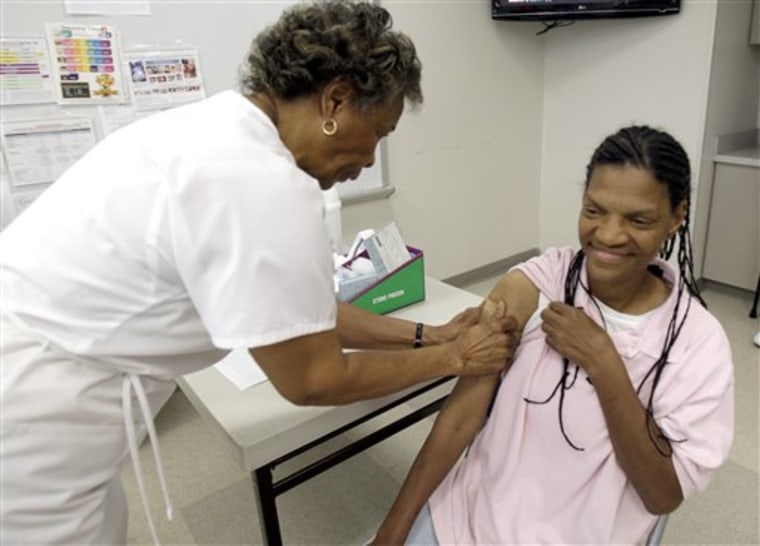The biggest manufacturers of seasonal flu vaccines for the U.S. said they are delaying or reducing the number of doses shipped to health care providers — partly because of the crunch to produce millions of doses of the swine flu vaccine.
The pharmaceutical company Sanofi Pasteur said it has shipped more than half its doses of seasonal flu vaccine ordered by U.S. customers. But the company recently sent notices to clients indicating the rest may not arrive until November.
Novartis and GlaxoSmithKline said their shipments are on schedule. But they've told customers they may get less than originally ordered.
The three companies combined were expected to supply about 100 million of the nation's estimated 114 million doses of the seasonal flu vaccine.
The delays and cutbacks already have forced some doctors to turn away parents seeking vaccines for their infants and toddlers and caused some public health offices to cancel scheduled community vaccination clinics.
"We understand it does create an inconvenience for some people who wanted to hold their seasonal influenza campaigns earlier," said Sanofi Pasteur spokeswoman Donna Cary. "We apologize for that, but we're doing every thing we can."
The federal Centers for Disease Control and Prevention said Thursday there is no cause for big concern. That's because about 70 million doses already have been delivered, and vaccinations started unusually early. Clinics for seasonal flu vaccine typically ramp up in February, and the virus usually peaks in January or February. It takes about two weeks for a flu shot to be fully effective.
"Vaccine, while it's coming out, may not be coming out to some of the providers when they thought they were going to get it," Skinner said. But, "it's coming, and people may have to be patient and persistent in inquiring about when they can get it."
About 100 million people typically get a winter flu shot in the U.S. But health care providers say the early demand appears to be higher this year, because of public attention to the swine flu pandemic. The swine — or H1N1 — flu currently is the predominant virus and requires a separate vaccination.
Novartis International AG, based in Basel, Switzerland, halted its production of the seasonal flu vaccine in July to meet demand for the swine flu vaccine, said company spokesman Eric Althoff. It later realized the cultures had not developed as robustly as expected, but by then it was too late to resume production of the regular flu vaccine, he said.
As a result, "there might be some customers that will receive a little less than initially ordered," Althoff said, "but it's within the terms of all contracts" that allow for a 10 percent variation.
Sanofi Pasteur, the Swiftwater, Pa.-based vaccines division of the French drug-maker Sanofi-Aventis SA, normally finishes producing seasonal flu vaccines by the beginning to middle of October, but expects to run several weeks later this year, Cary said. The company attributed its backlog to slow-growing laboratory cultures and its production of 75.5 million doses of the swine flu vaccine for the United States.
But "everybody who ordered vaccine from us will be getting it," Cary said.
At the Jefferson City Medical Group, which serves about 70,000 patients in mid-Missouri, the vaccine delay primarily is affecting children younger than three — considered to be a high-risk group for the flu.
The medical group has received just 150 of its 700 doses of preservative-free vaccines, which Missouri law stipulates must be used for children between six and 35 months old. Doctors used the last of those this week and have been told they may have to wait another month to get the rest of their supply, said Cindy Andrews, a nurse who is helping coordinate clinic's flu vaccines.
The shortage of seasonal flu vaccine hit the University of Minnesota in mid-September. Student Eli Cizewski-Robinson, 21, said he got discouraged by the long lines and left. He planned to come back the next week, but the university's health service ran short of vaccine and canceled the rest of its clinics until it was re-supplied.
"I haven't been able to get one yet," he said Thursday.
In northeast Kansas, at least three health care providers have postponed flu-shot clinics indefinitely because vaccine supplies have been delayed. Lyon County, Kan., health officer Ann Mayo said an Oct. 6 drive-through vaccination clinic has been canceled because the office hasn't received an additional 1,500 doses that were due to arrive this week from Sanofi Pasteur.
The Smith Drug Co., based in Spartanburg, S.C., supplies vaccines in 19 southeastern states to clients that predominantly are independent pharmacies. Company president Ken Couch said he's frustrated he can't get the seasonal flu vaccines that he ordered last spring.
"They're saying they're going to have it, but it's going to be the end of November. I almost want to say what's the point?" said Couch, later adding: "We've told our customers that we have none and we will let them know if we get any."
